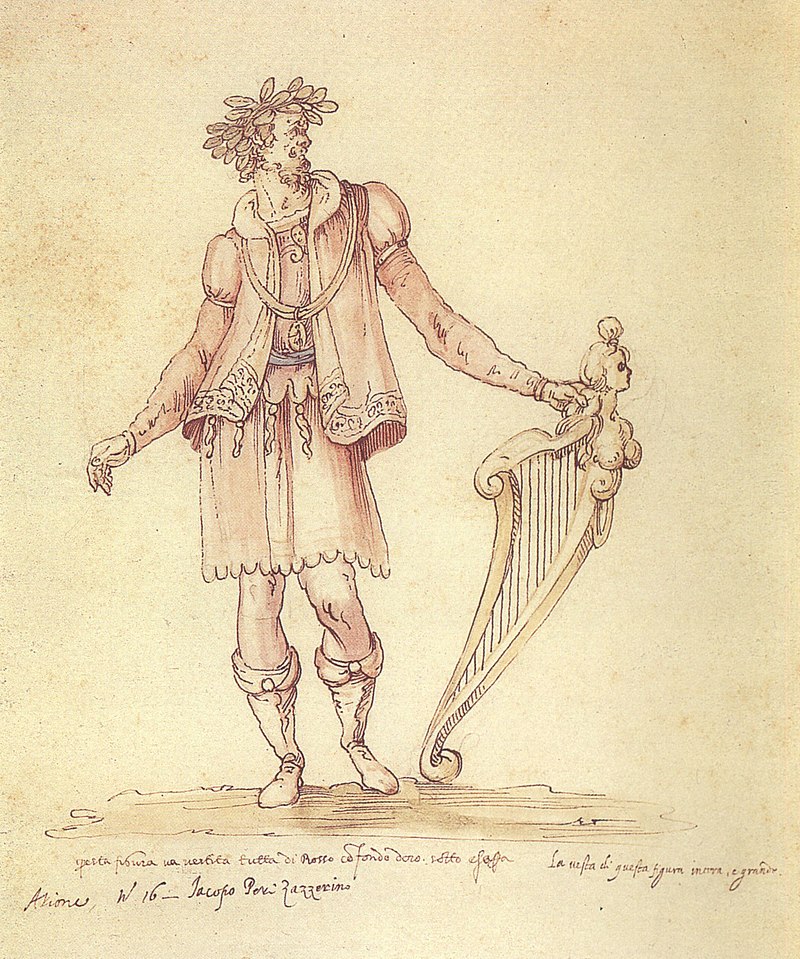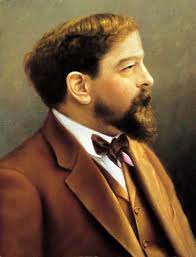This Week in Classical Music: August 19, 2024. Peri, Bernstein. Jacopo Peri, an Italian composer of the transitional period between the Renaissance and Baroque and author of the very first opera, Dafne, was born on August 20th of 1561. Last year we got involved with Peri, his contemporary Emilio de’ Cavalieri, and the process of transitioning from one, deeply established musical style to a very different one, a style that may be considered a “lesser” one, at least in its initial phase. We still find this process and the personalities involved very interesting. You may want to read about Peri and the period here, here, and here.
Claude Debussy, one of the most influential composers of his time, was born in St. Germain-en-Laye on August 22nd of 1862. And when we say, “of his time,” we’re talking about one of the most fecund periods of classical music, the period from 1894, when Debussy composed Prélude à l'après-midi d'un faune, till his death in 1918 at the age of 55. Just for reference, let’s take a look at who else was active during the period. Here’s what we see: Gustav Mahler, who, by the way, conducted the Prélude in New York in 1910, his whole output falls within this period; Sergei Rachmaninov, whose piano concertos no. 2 and no. 2?? were written in the first decade of the 20th century; much of Alexander Scriabin’s late works; Richard Strauss’s most important tone poems and operas such as Salome and Der Rosenkavalier, all fall within the period. Composers as different as Arnold Schoenberg, Ottorino Respighi, Manuel de Falla, and of course, Debussy’s younger contemporary and friend Maurice Ravel were all extremely productive during the same period. And still, Debussy’s star shines brightly. While his piano and orchestral works are probably among his most popular, he worked in many genres. Pelléas et Mélisande, premiered in 1902, is one of the most important operas of the 20th century. His chamber music is brilliant; he also wrote wonderful songs. We have quite a bit of Debussy’s music in our library, you may take a look here. A note on labeling: Debussy created a musical style, at some point called “Impressionism,” the label stuck; he hated the term, and so did Ravel, another “impressionist.”
It's said that Debussy influenced all composers of the 20th century except for Schoenberg. That is an exaggeration, but Debussy did influence many composers, from Stravinsky to Les Six and on. One composer also born this week who clearly wasn’t is Karlheinz Stockhausen. Some years ago we wrote: “In our library, we have three recordings of Karlheinz Stockhausen. Two of them are rated “one note,” the lowest rating that could be given. Considering that one piece is played by the pianist Pierre-Laurent Aimard, we can safely assume that it’s not the performance that our listeners disliked but the pieces themselves. Stockhausen […] is considered one of the seminal composers of the second half of the 20th century. While we acknowledge the disapproval of some listeners, we think that his music is worth the effort, even if in small doses, and will continue bringing him up on occasion.” Since then, we added just one piece by Stockhausen, a composition called Kreuzspiel. It didn’t get rated, maybe nobody wanted to listen to it. The one-note ratings on older recordings still stand.
The great Leonard Bernstein was born on August 25th of 1918. Also, Lili Boulanger, whose life was tragically short, was born on August 21st of 1893; the Romanian composer and violinist George Enescu, born on August 19th of 1881; and a very interesting Austrian (and later American) composer Ernst Krenek, he was born on August 23rd of 1900.
Peri, Debussy 2024
This Week in Classical Music: August 19, 2024. Peri, Bernstein. Jacopo Peri, an Italian composer of the transitional period between the Renaissance and Baroque and author of the very first opera, Dafne, was born on August 20th of 1561. Last year we got involved with Peri, his contemporary Emilio de’ Cavalieri, and the process of transitioning from one, deeply established musical style to a very different one, a style that may be considered a “lesser” one, at least in its initial phase. We still find this process and the personalities involved very interesting. You may want to read about Peri and the period here, here, and here.
first opera, Dafne, was born on August 20th of 1561. Last year we got involved with Peri, his contemporary Emilio de’ Cavalieri, and the process of transitioning from one, deeply established musical style to a very different one, a style that may be considered a “lesser” one, at least in its initial phase. We still find this process and the personalities involved very interesting. You may want to read about Peri and the period here, here, and here.
Claude Debussy, one of the most influential composers of his time, was born in St. Germain-en-Laye on August 22nd of 1862. And when we say, “of his time,” we’re talking about one of the most fecund periods of classical music, the period from 1894, when Debussy composed Prélude à l'après-midi d'un faune, till his death in 1918 at the age of 55. Just for reference, let’s take a look at who else was active during the period. Here’s what we see: Gustav Mahler, who, by the way, conducted the Prélude in New York in 1910, his whole output falls within this period; Sergei Rachmaninov, whose piano concertos no. 2 and no. 2?? were written in the first decade of the 20th century; much of Alexander Scriabin’s late works; Richard Strauss’s most important tone poems and operas such as Salome and Der Rosenkavalier, all fall within the period. Composers as different as Arnold Schoenberg, Ottorino Respighi, Manuel de Falla, and of course, Debussy’s younger contemporary and friend Maurice Ravel were all extremely productive during the same period. And still, Debussy’s star shines brightly. While his piano and orchestral works are probably among his most popular, he worked in many genres. Pelléas et Mélisande, premiered in 1902, is one of the most important operas of the 20th century. His chamber music is brilliant; he also wrote wonderful songs. We have quite a bit of Debussy’s music in our library, you may take a look here. A note on labeling: Debussy created a musical style, at some point called “Impressionism,” the label stuck; he hated the term, and so did Ravel, another “impressionist.”
Gustav Mahler, who, by the way, conducted the Prélude in New York in 1910, his whole output falls within this period; Sergei Rachmaninov, whose piano concertos no. 2 and no. 2?? were written in the first decade of the 20th century; much of Alexander Scriabin’s late works; Richard Strauss’s most important tone poems and operas such as Salome and Der Rosenkavalier, all fall within the period. Composers as different as Arnold Schoenberg, Ottorino Respighi, Manuel de Falla, and of course, Debussy’s younger contemporary and friend Maurice Ravel were all extremely productive during the same period. And still, Debussy’s star shines brightly. While his piano and orchestral works are probably among his most popular, he worked in many genres. Pelléas et Mélisande, premiered in 1902, is one of the most important operas of the 20th century. His chamber music is brilliant; he also wrote wonderful songs. We have quite a bit of Debussy’s music in our library, you may take a look here. A note on labeling: Debussy created a musical style, at some point called “Impressionism,” the label stuck; he hated the term, and so did Ravel, another “impressionist.”
It's said that Debussy influenced all composers of the 20th century except for Schoenberg. That is an exaggeration, but Debussy did influence many composers, from Stravinsky to Les Six and on. One composer also born this week who clearly wasn’t is Karlheinz Stockhausen. Some years ago we wrote: “In our library, we have three recordings of Karlheinz Stockhausen. Two of them are rated “one note,” the lowest rating that could be given. Considering that one piece is played by the pianist Pierre-Laurent Aimard, we can safely assume that it’s not the performance that our listeners disliked but the pieces themselves. Stockhausen […] is considered one of the seminal composers of the second half of the 20th century. While we acknowledge the disapproval of some listeners, we think that his music is worth the effort, even if in small doses, and will continue bringing him up on occasion.” Since then, we added just one piece by Stockhausen, a composition called Kreuzspiel. It didn’t get rated, maybe nobody wanted to listen to it. The one-note ratings on older recordings still stand.
The great Leonard Bernstein was born on August 25th of 1918. Also, Lili Boulanger, whose life was tragically short, was born on August 21st of 1893; the Romanian composer and violinist George Enescu, born on August 19th of 1881; and a very interesting Austrian (and later American) composer Ernst Krenek, he was born on August 23rd of 1900.